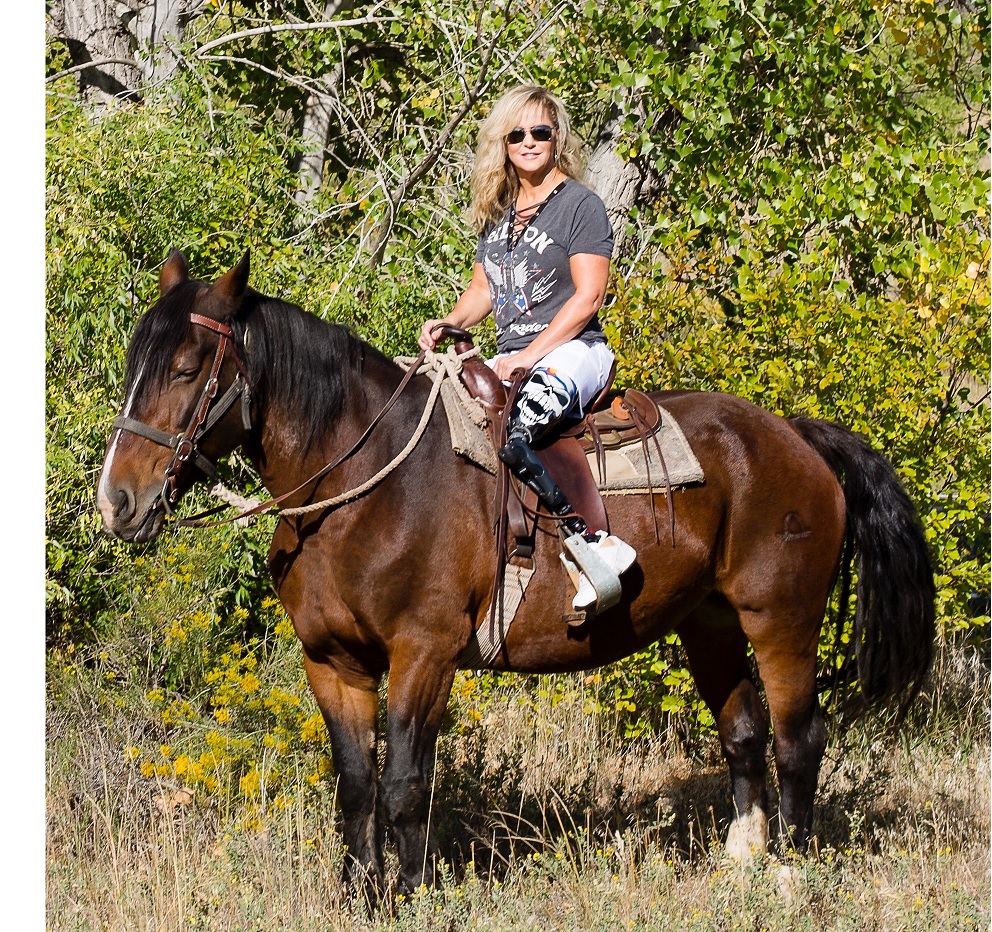When Traci Miller’s prosthetic leg draws attention, she doesn’t take offense. She takes questions.

This guest article comes to us from Traci Miller of Littleton, CO. A longtime Amplitude reader who enjoys horseback riding, bikes, fitness, and ATVs, Traci spent 22 years as a 911 dispatcher and now works in the mortgage industry. She has two kids and four grandkids. This is Traci’s first article for Amplitude.
On a recent trip to the store, as I was waiting in line to check out, I noticed a brother and sister around seven and nine years old pointing at me, staring, and talking about my prosthetic leg. Their parents were occupied and looking elsewhere, with no idea what had caught their children’s interest. I looked right at the kids and said, “I bet you have never seen a leg like this one, huh?”
I might have reacted differently when I first lost my left leg above the knee at age 21. Amputation was the best option for me, but it took me a long time to accept how I appeared, both to myself and to others. In the decades since then, I’ve discovered so much about myself. I have accepted that I may look different, but that doesn’t mean I am different. Self-acceptance has given me the ability to teach people, instead of being hurt or annoyed by their stares. Children in particular tend to stare and point at my leg, and I get it! My leg looks completely different than their legs. They just want to know: what? how? and why?
Those are the questions I wanted to answer for those two kids in the store. They told me no, they never had seen a leg like mine. I said, “I think it is pretty cool looking, but it is different than yours,” and I asked if they had any questions about it. Sure enough, they did! I explained that my original leg was hurt and could not be helped, so I had to get a replacement leg. I showed them how I can bend my leg up to put shoes on easily. They loved the skull I have on the side of my socket. They asked if I could feel it if they touched it. I explained that I cannot feel the touch, but I do feel a vibration when it is tapped on or bumped. The toenails were a big hit with both of them. They were impressed at how real my foot appeared.
By this time the parents had joined us. They were standing behind the kids, just watching and listening to our interaction. When we were done talking, it was obvious that both of the kids were at ease with my leg. I had helped them understand that I am not scary and they have no reason to fear me—and, more important, that they have no reason to fear limb difference.
As I walked away, their mother followed me. She was so grateful for me taking the time to explain my leg, in a kind way, to her children. As I guessed, they had never seen a prosthesis in their life. They had no intention to hurt my feelings. They were just curious, which is natural—because my leg is different. I have found that most young boys think I appear to be part robot, and they love it! Girls tend to love my painted toenails.
I have seen parents get mad at their children for questioning why my leg is different, but they really shouldn’t. Human nature gives us the need to know and the desire to ask questions. Yet it also holds us back. We wonder if it is rude to ask, or if we will hurt someone’s feelings or maybe even make them angry enough to yell at us.
When I was 21, I had people say hurtful things to me. I probably would have been angrier at adults for asking me about my leg, and I would have expected them to teach their children. I have grown and realized so much since those days. How do we learn if we do not ask? How do we expect non-amputees to understand if we do not share our experiences? As amputees, we don’t want to be judged or treated differently from anyone else. So now I take every opportunity to let people learn and understand what happened to me—and why I had to have an amputation. I show them how able I am to do almost all of the same things they do!
If children can learn at a young age how to accept people’s differences—whether it is a missing limb, a burn scar, an adaptive mobility device, or any other difference—we will all live together in a healthier place.
How do you deal with being pointed or stared at in public? Send your stories to larry@livingwithamplitude.com.